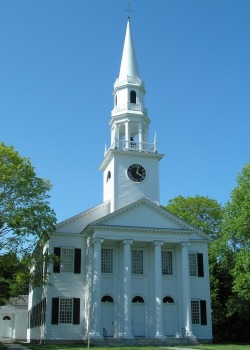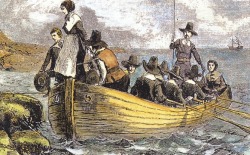Congregational

- Congregationalism was/is as much a movement as a denomination. It has it's roots in the idea that every church is free to govern itself, as opposed to a Catholic hierarchy type set-up.
- It began when a group of people in England in the late 16th and 17th centuries noticed that as the church had grown, it had come more and more under the authority of a guy rather than God. For example, the Pope was running the Catholic church, the King of England was running the church of England, ect. So they decided to try and take it back to it's roots and establish their version of the original church.
- Claims to have it's roots in the principals described by a guy named Robert Browne who lived from 1550-1633.
- Many of the early Congregationalists were originally called Independents and still are in certain parts of Europe.
- each individual church is free to form it's own forms of worship and elects its own pastors, teachers, elders, ect.
- It began when a group of people in England in the late 16th and 17th centuries noticed that as the church had grown, it had come more and more under the authority of a guy rather than God. For example, the Pope was running the Catholic church, the King of England was running the church of England, ect. So they decided to try and take it back to it's roots and establish their version of the original church.
- Claims to have it's roots in the principals described by a guy named Robert Browne who lived from 1550-1633.
- Many of the early Congregationalists were originally called Independents and still are in certain parts of Europe.
- each individual church is free to form it's own forms of worship and elects its own pastors, teachers, elders, ect.

- Was brought over to America by the Pilgrims who established colonies at Plymouth.
- Early Congregational churches played important roles in support of women's suffrage and the abolishion of slavery.
- Early Congregational churches played important roles in support of women's suffrage and the abolishion of slavery.

-Education is an important aspect of Congregationalism and members of the movement have established schools such as Harvard, Yale, and Dartmouth.
- As of the 21st Century, most Congregationalists are split into three groups: The Congregational Christian Churches, Conservative Congregational Christian Conference, and the United Church of Christ (who are quite liberal and not to be mistaken for the Church of Christ.)
- This Congregation ruled ideology has had a large influence on other American denominations such as Baptists, who are also ruled as a democracy.
- As of the 21st Century, most Congregationalists are split into three groups: The Congregational Christian Churches, Conservative Congregational Christian Conference, and the United Church of Christ (who are quite liberal and not to be mistaken for the Church of Christ.)
- This Congregation ruled ideology has had a large influence on other American denominations such as Baptists, who are also ruled as a democracy.